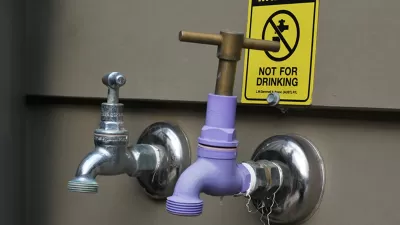On Monday, August 4, half a million people in the Toledo, Ohio metro region could once again drink from their water taps after a weekend without safe drinking water due to a toxin resulting from an algal bloom in the city's water supply, Lake Erie.
Ohio has taken a major step to prevent a recurrence of the drinking water shutdown by requiring farmers to obtain a license to fertilize their fields, report Mark Peters and Matthew Dolan of The Wall Street Journal. Fertilizer runoff is considered one of the major causes of the algal blooms as it contributes a large amount of nitrogen and phosphorus to Lake Erie.
Regulators say the new Ohio licenses, which will become mandatory in 2017 and will require farmers to take a one-day class, are aimed at cutting fertilizer use by showing farmers how they can apply less nutrients without hurting crop yields. The law also allows regulators to revoke such certifications if problems are found on a farm.
The blooms look like thick pea soup as shown in this dramatic photo in National Geographic of a massive algae bloom in 2011. The August 4th article warns that these blooms may become commonplace due in part to climate change.
The licenses will hopefully be just the first of more strategies to come. "Chicago Mayor Rahm Emanuel on Tuesday echoed calls for mayors of Great Lakes cities to hold a summit on water issues in the wake of the recent crisis," add Peters and Dolan. In February "the International Joint Commission, a U.S.-Canadian group monitoring the Great Lakes, called for cutting the daily amount of phosphorus flowing into Lake Erie by nearly half by 2022 in a bid to protect drinking water as well as fish," they write.
The report urged other states, including Michigan, New York, Ohio, Pennsylvania and Indiana, as well as parts of Canada, to stop farmers from applying fertilizers on snow-covered or frozen ground to help reduce nutrient levels in waterways
Adam Sharp, vice president of public policy for the Ohio Farm Bureau Federation, praised the new license requirement. "The law has 'teeth' because it will go after bad actors who recklessly apply fertilizer," notes the Bureau's public statement on the water crisis.
However, some feel that the license, plus additional recent measures the state has taken to reduce water pollution, don't go far enough.
"This isn't a matter of farmers fine-tuning what they're doing," said Howard Learner, president of the Environmental Law and Policy Center, a Midwest advocacy group. "This requires a substantial rethinking of how nitrogen and phosphorus is used in the agriculture sector," he added.
Correspondent's note: Subscriber-only content to The Wall Street Journal article will be available to non-subscribers for up to seven days after August 6th.
FULL STORY: Ohio Regulators Aim to Help Water Problem With Fertilizer Licenses

Trump Administration Could Effectively End Housing Voucher Program
Federal officials are eyeing major cuts to the Section 8 program that helps millions of low-income households pay rent.

Planetizen Federal Action Tracker
A weekly monitor of how Trump’s orders and actions are impacting planners and planning in America.

Ken Jennings Launches Transit Web Series
The Jeopardy champ wants you to ride public transit.

Driving Equity and Clean Air: California Invests in Greener School Transportation
California has awarded $500 million to fund 1,000 zero-emission school buses and chargers for educational agencies as part of its effort to reduce pollution, improve student health, and accelerate the transition to clean transportation.

Congress Moves to End Reconnecting Communities and Related Grants
The House Transportation and Infrastructure Committee moved to rescind funding for the Neighborhood Equity and Access program, which funds highway removals, freeway caps, transit projects, pedestrian infrastructure, and more.

From Throughway to Public Space: Taking Back the American Street
How the Covid-19 pandemic taught us new ways to reclaim city streets from cars.
Urban Design for Planners 1: Software Tools
This six-course series explores essential urban design concepts using open source software and equips planners with the tools they need to participate fully in the urban design process.
Planning for Universal Design
Learn the tools for implementing Universal Design in planning regulations.
Heyer Gruel & Associates PA
Ada County Highway District
Institute for Housing and Urban Development Studies (IHS)
City of Grandview
Harvard GSD Executive Education
Toledo-Lucas County Plan Commissions
Salt Lake City
NYU Wagner Graduate School of Public Service




























